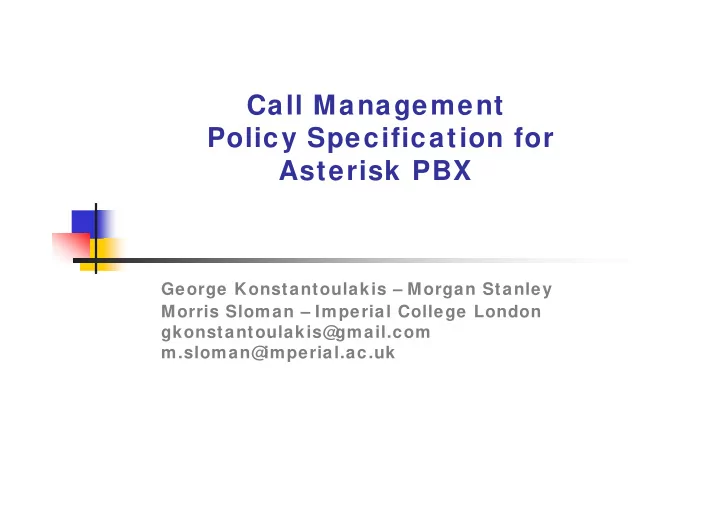

Call Management Policy Specification for Asterisk PBX George Konstantoulakis – Morgan Stanley Morris Sloman – Imperial College London gkonstantoulakis@ gmail.com m.sloman@ imperial.ac.uk
Requirements User Policy specification for call handling � � When busy, customer calls forwarded to team members colleagues hear my schedule friends -> voicemail � During 9-5, when I am out of office incoming calls -> mobile, cross-town-office Administrator Policies for authorisation and call management � � Calls to mobiles, receive message 5 minute duration after 5 min. terminate � Research & sales dept. staff permitted to dial international receive message 10 min duration � Calls to cross-town-office use SIP over datalink � Switch service provider if failure rate exceeds threshold 2
Asterisk PBX � Asterisk is public domain VoIP PBX software for standard PCs � Not easy to manage, configure or maintain � Sophisticated call management features via configuration files � Forwarding, monitoring, recording, block, voicemail, ring types, queues, hunt groups, query variables, access database � Example for calls to ext. 123 exten = > 123,1,Answer() exten = > 123,2,Playback(myMessage) exten = > 123,3,Voicemail(123) exten = > 123,4,Hangup() 3
Example Asterisk Administrator’s Call Management ‘Policy’ [Globals] SipOUT = SipFirst FailedCalls = 0 [SipOutgoingCallsCheck] exten = > _X,1,Dial(${ EXTEN} @${ SipOUT} ) ;;; After the call check the result in the ;;; DIALSTATUS variable. If it is a failed call ;;; go-to step 101 otherwise exit exten = > _X, 2, GotoIf ($[${ DIALSTATUS} = CONGESTION ]? 101:200) ;;; FAILED CALL exten = > _X,101,SetVar(FailedCalls = ${ FailedCalls} + 1) ;;; If failed calls are more than 10, switch providers exten = > _X,102, GotoIf($[${ FailedCalls } = 10 ]? 103:200) exten = > _X,103, SetVar(SipOUT = SipSecond) exten = > _X,104, SetVar(FailedCalls = 0) exten = > _X, 105, Hangup() ;;;; OK EXIT exten = > _X, 200, Hangup( 4
Conflict Handling � Conflicts due to granularity of number specification � P1 All calls from Greece (0030….) Forward to mobile, change caller ID to 101 to indicate from Greece, record. � P2 Call from 003021080777777 (from Brother) Forward to mobile, + home � Conflict detected and user informed � Default resolution is more specific policy takes precedence so P2 over-rides P1 5
Example End User Policy Specification Event (incoming or outgoing call) – condition – action rule � 6
7 Admin Policy Specification
8 Outgoing Call Handling
Outgoing Call Overheads LATENCY Ave. time in ms User DB Latency 5.776 User Policy Latency 0.238 Overall User Latency 6.01 Admin DB Latency 14.124 Admin Policy Latency 0.407 Overall Admin Latency 14.531 Overall Outgoing latency 20.546 9
Conclusions � 6 month Masters student project � Able to cater for specification of most policies � Evaluated by users and administrators inTelecomms Service Provider (InAccess) in Athens � Application specific constrained policy specification is essential for non-technical end-users � Useful for Administrators � Reasonable performance with no attempt to optimise 10
Recommend
More recommend